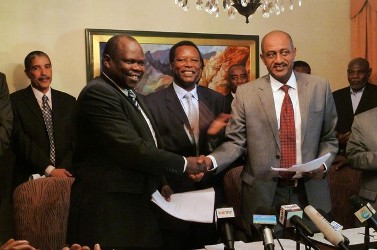Sudan confirms oil transportation prices, talks to resume by the end of August
August 6, 2012 (KHARTOUM) — Sudan spoke on Monday for the first time Monday about the amount of money agreed with South Sudan to transport its oil production. Khartoum also announced that the talks on the remaining unresolved issues will resume during the last week of this month.
 Sudan and South Sudan agreed on oil transportation fees on Friday 3 August late in the evening after a compromise proposed by the mediation and a telephone call from the chief mediator to South Sudanese President Salva Kiir. The Sudanese delegation was the first to agree.
Sudan and South Sudan agreed on oil transportation fees on Friday 3 August late in the evening after a compromise proposed by the mediation and a telephone call from the chief mediator to South Sudanese President Salva Kiir. The Sudanese delegation was the first to agree.
Thabo Mbeki held a press conference during the night to announce the agreement but he did not disclose the price accepted by the two delegations.
In Khartoum however news reports, attributed to anonymous sources, emerged with $25 as the agreed price between the two delegations. Meanwhile, in Juba, South Sudan chief negotiator Pagan Amum said the parties agreed on $9.10 for the transportation of oil produced in Petrodar fields and $11 for that of GNPOC fields.
Sudan’s foreign ministry spokesperson, Al-Obeid Morawah, told reports in Khartoum that the average of the agreed fee for oil transportation is $10 per barrel.
He further said that this deal will last for three and half years after what the parties would negotiate lower rates, if they decide to renew the deal.
Pagan, that day, stated that his government already decided to construct an alternative pipeline expecting that it will “be up” when this deal expires.
Al-Obeid also said that Juba will pay Khartoum $3.028 billion as transitional financial assistance over this period of three and half years. This financial package is supposed to cover the third of Sudan’s budget deficit after the independence of South Sudan.
The two parties also in line with the deal have to seek the support of the international community to fund development programme and to write off Sudan’s debit.
This step is included in the resolution of donor conferences held after the signing of the 2005 between Khartoum and the Sudan People’s Liberation Movement. but Washington forced earlier this year Turkey to cancel a donor meeting to support Sudan as it wanted the later to allow humanitarian access to South Kordofan.
The Sudanese diplomat explained that Khartoum’s negotiating team did not make any statement and kept silence about the deal because they ignored the position of South Sudanese government when they left the venue of the talks.
Different sources said Pagan Amum expressed some reservation about the compromise Mbeki proposed to the two sides after the end of the deadline fixed by the UN Security Council. The mediator called President Kiir directly before to announce it to the press.
Al-Obeid said, a protocol on oil and financial arrangements will be signed when the two sides resume talks in the period between 26 to 28 August.
He however stressed that it will not be enforced without an agreement on the security issue.
Sudan refuses to accept a map the mediation proposed to operationalise a buffer zone on the common border saying the mediators consider a Sudanese location for the first time as disputed areas. But, the latter says this map does not aim to demarcate disputed borders.
On 9 August, the Security Council will discuss the progress made in the talks and consider if there is a need to impose economic sanctions or not as the parties failed to reach a comprehensive deal on the outstanding issues.
The deal, which is hailed by the international community and opposition parties from both sides, is however criticised by many from both sides. In Juba its seen as conceding too much. In Khartoum, the negotiators are criticised for accepting a very weak compromise.
Gazhi Salah Eddi, head of National Congress Party block in the Sudanese parliament, denied reports saying that the NCP Caucus decided to reject the oil deal reached in Addis Ababa.
He said that the parliamentary group of the ruling party did not take any decision as the issue will be discussed when it is referred as an international agreement between Sudan and the South Sudan for approval before its ratification by the president.
He also denied reports about “heated meeting” of the NCP parliamentary block were the deal was rejected. He pointed out that it was a meeting of the heads of parliamentary committees to discuss economic issues.
The spokesperson of the foreign ministry expected that after the signing, technical meetings will be held between experts from the two sides to prepare the resumption of oil production and transportation.
(ST)
